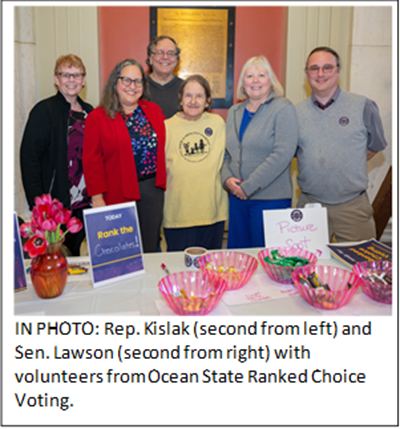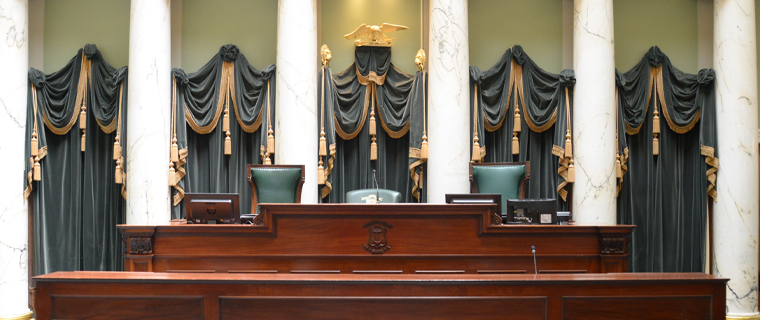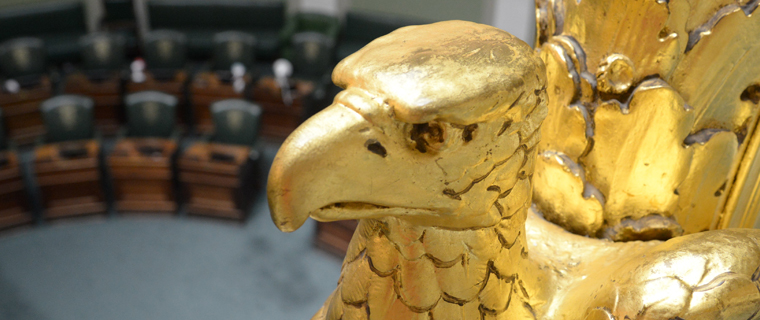STATE HOUSE –It took four rounds of voting, but Ghirardelli Milk Chocolate Caramel won a decisive victory this Valentine’s Day.

The sweet treat was the winner in a “chocolate election” staged Wednesday by Rep. Rebecca Kislak (D-Dist. 4, Providence) and Senate Majority Whip Valarie Lawson (D-Dist. 14, East Providence) as a demonstration of ranked-choice voting.
Ranked-choice voting, also called instant run-off voting, allows voters to rank the candidates in order of preference in races when there are more than two candidates. The votes are tabulated in rounds, with the lowest-ranked candidates eliminated in each round until there are only two candidates left. The one who is determined to have received the majority of the votes in the final round is declared the winner.
Wednesday’s election — held online and open to anyone — pitted Ghirardelli Milk Chocolate Caramel against Hershey Zero Sugar Chocolate, Lindt White Chocolate Truffles, Andes Creme de Menthe and That’s It Dark Chocolate Espresso Truffles, and asked voters to rank the five chocolaes in their order of preference. Samples of all the candidates were available at tables outside the House chambers around yesterday’s legislative session.

In the first round of voting, Ghirardelli Milk Chocolate Caramel received 40 first place votes, or about 32% of the total, giving it a small lead over That’s It Dark Chocolate Espresso Truffles, which received 33 votes, or about 27% of the vote. Third place was Andres Crème de Menthe (28), followed by Lindt White Chocolate Truffles (18) and Hershey Zero Sugar (5). Full election results are available at this link.
Since no chocolate received 50% or more of the vote, the last place finisher, Hershey Zero Sugar, was eliminated and its second-place votes added to the totals of the remaining candies for the second round. This increased by two votes both Ghirardelli Milk Chocolate Caramel and That’s It Dark Chocolate Espresso Truffles totals, maintaining a seven-vote lead for Ghirardelli. One of the five votes for Hershey’s Zero Sugar did not go any other chocolate because the voter did not select a second choice – voters in ranked choice are not required to vote for any candidate beyond their first choice if they so choose, but if the event their first choice does not win, their vote will have no effect on the final outcome.
After two more rounds of this process, Ghirardelli Milk Chocolate Caramel finished with 79 votes to 44 for That’s It Dark Chocolate Espresso Truffles, and a commanding 63% of the total vote. A visualization each voting round is online here.
“We presented five delicious choices and the voters selected a clear winner. While ranked-choice voting did not change the outcome compared to the more common simple majority system, it did show that Ghirardelli Milk Chocolate Caramel enjoyed broad popular support. Without ranked-choice voting, supporters of the other chocolates might always wonder if a majority of voters actually preferred a different candy,” said Representative Kislak. “In this light-hearted demonstration, that wouldn’t have been the end of the world, but in real world elections with more than two candidates, the question of which candidate a majority of voters preferred can have serious consequences. Today we demonstrated how ranked-choice voting can answer that question quickly and simply.”
Said Senator Lawson, “Ranked-choice voting is an idea whose time has come. Our demonstration this year showed the advantage of clarity that ranked-choice voting brings to a crowded election field. In the real world it’s being used successfully in other states and municipalities, and voters in those jurisdictions have also been happy the process and the results. We believe that ranked-choice elections would better represent voter preferences, and so improve Rhode Islanders’ satisfaction and engagement in our elections.”
Senator Lawson and Representative Kislak have introduced legislation (2024-S 2425, 2024-H 7540) that would institute ranked-choice voting for presidential preference primaries, beginning with the 2028 presidential election. In 2020, the Democratic presidential primaries in Alaska, Nevada, Hawaii, Kansas and Wyoming all employed ranked-choice voting.
Proponents of ranked-choice voting point to its elimination of “spoiler” candidates or vote-splitting — situations where two or more candidates who appeal to a group of like-minded voters split that group’s votes, enabling the victory of a different candidate even if that candidate doesn’t win a majority.

The advantage to voters, according to FairVote, a national organization dedicated to advancing ranked-choice voting, is that “voters can sincerely rank candidates in order of preference. Voters know that if their first choice doesn’t win, their vote automatically counts for their next choice instead. This frees voters from worrying about how others will vote and which candidates are more or less likely to win.” There also exists research suggesting ranked-choice voting results in more civil campaigns nd less negative campaigning.
